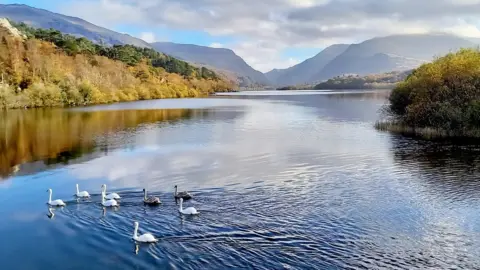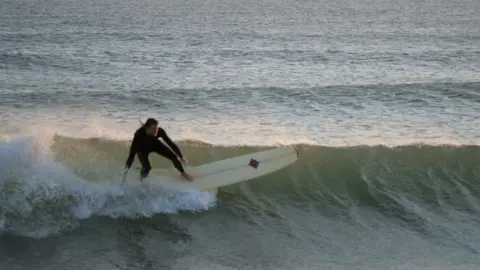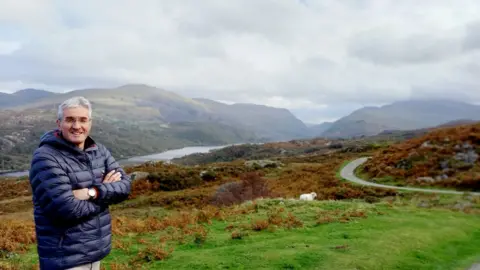Welsh Water: Sewage dumped in waterways for 600,000 hours
 Dr Robin Parry
Dr Robin ParryWater company Welsh Water released sewage into rivers, lakes and the sea around Wales for almost 600,000 hours last year, data shows.
This accounts for more than 25% of all hours of discharges into waterways across Wales and England.
Latest figures also show more than 83,000 spills in 2022 - 77,000 of which were "significant".
The not-for-profit company said removing combined storm overflows (CSOs) was too expensive.
It added that it was targeting investment in areas with the biggest environmental impact.
Although not illegal, campaigners and experts say releasing the sewage poses a danger to human and animal health.
More water enters the system during heavy rainfall, which can include sewage, and companies then have to release it to relieve the pressure through CSOs.
Some of Wales' current sewer infrastructure dates back to the Victorian era.
When it is released in this way, the sewage contains things like human waste, toilet paper and hygiene material which pose a serious risk to local wildlife and swimmers.
Welsh Water said CSOs had always existed but it was possible they were releasing more sewage because of more intense storms linked to climate change.
It also points to increased run-off from paved and concrete surfaces, which means more water runs into the drains than gets absorbed into the ground.
But the 592,569 of release time hours in Wales - 602,988 hours across the company's whole patch which includes areas in England around Hereford and Chester - is still lower than in 2021 by almost 25%.
That is partly due to weather, with Wales seeing the driest January to August since 1976.
But why not remove storm overflows?
Welsh Water said it would be unaffordable and would take decades to remove all storm overflows, so is instead targeting investment to the CSOs which have the biggest environmental impact.
The company estimates the removal would take anywhere between £9bn and £14bn, which would have a "significantly detrimental effect" on bills.
It also said it would mean extensive digging to replace sewers.
The new figures come just a few days after Welsh Water revealed customers would face "significant bill increases" to pay for measures to stop sewage being released.
The rivers with the most sewage dumped into them in 2022 were the River Garw, River Tawe, River Teifi, River Usk, River Rhymney and the River Taff.
The area at the top of the list was Carmarthenshire - with more than 11,000 sewage discharges, totalling about 88,000 hours.
'It makes me feel pain'
Lloyd Nelmes, 29, from Pembrokeshire, is a Surfers Against Sewage representative and works for Sea Trust Wales. He said the pollution has been making him ill.
"It's pretty worrying and physically it makes me feel in pain," he said.
"I get ear infections quite often from surfing and swimming. It's definitely detrimental to sea life - it's drastically reducing while microalgae and things that thrive on increased nutrients are doing very, very well."
 Lloyd Nelmes
Lloyd NelmesMr Nelmes continued: "It is going to cost an awful lot of money and people don't want bills to rise, but I'm sure something can be done.
"I'm a couple of miles from one [CSO] that shoots brown liquid out to the sea and shoots brown liquid. It smells horrible.
"I hope the increase in lots of water activities will increase the pressure and awareness. This has been happening for a long time."
He said he believed "things are changing", adding: "I'm only 29 and you wouldn't have thought there'd be enough time to see a change - but I definitely have. There's certainly increased pressures on wildlife."
Dr Robin Parry is the chairman of the North Wales Rivers Trust and the Seiont, Gwyrfai and Llyfni Anglers in Gwynedd.
"It's not a surprise to me - it's been going on for decades," he said.
"It's not very pleasant to be swimming in water that's got sewage in it."
 Dr Robin Parry
Dr Robin ParryDr Parry said there was need for education on topics such as how we use our drainage system and what goes down the toilet.
He added: "There must be investment into the infrastructure. I know Welsh Water are doing things like trying to reduce phosphates.
"But it's still a big, big problem and it needs more investment."

- COFIWCH DRYWERYN: A new podcast explores a dark and controversial chapter in Welsh history
- HEART VALLEY: A day in the life of a curious Welsh shepherd

